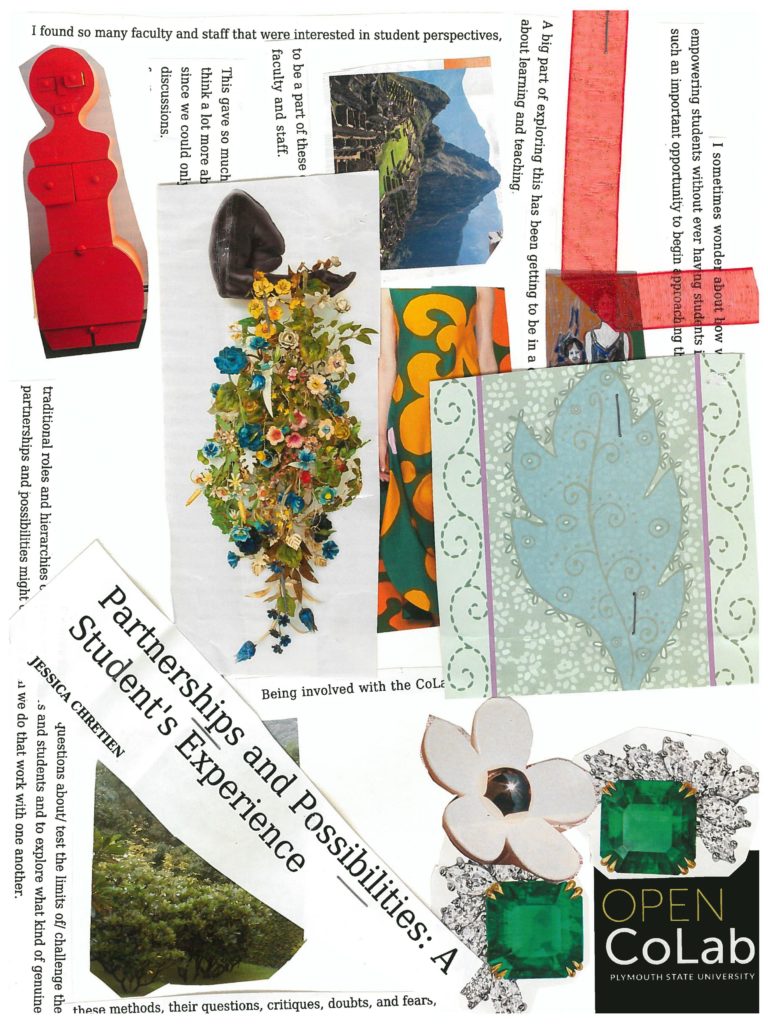15 Partnerships and Possibilities: A Student’s Experience
Jessica Chretien
Summer 2019
This summer I spent a lot of time working in the Open Learning and Teaching Collaborative, as well as participating in the Cluster Pedagogy Learning Community with 70+ members of faculty and staff, plus me, the only student.
Being involved with the CoLab and the CPLC has given me so many things, but what has felt most valuable about the CPLC is the way it allows me to ask questions about/ test the limits of/ challenge the traditional roles and hierarchies of/ between teachers and students and to explore what kind of genuine partnerships and possibilities might open up when we do that work with one another.
A big part of exploring this has been getting to be in a community with faculty and staff and talking about learning and teaching. I’ve loved getting to interact in groups with faculty and staff as we talked about what we value in education, what we know about and how we might implement non-traditional teaching and assessment methods, such as ungrading. I loved hearing everyone’s experiences with these methods, their questions, critiques, doubts, and fears; as well as adding my own. It felt important to be a part of these conversations as a student and to have the chance to be listened to and s e e n, by faculty and staff. I sometimes wonder about how we expect to have so many conversations about empowering students without ever having students in the room for these conversations, and this was such an important opportunity to begin approaching that issue.
I found so many faculty and staff that were interested in student perspectives, and had so many chances to talk one on one or in smaller groups with faculty who wanted to chat/ get feedback on some new approach they were thinking of doing in their course. Not only did this make the sense of genuine partnership more apparent, but I was so excited to hear about the things that faculty were working on, new things they were trying, the risks they were willing to take w i t h their students in order to really enact the values they believed in–values of agency, self-regulated learning, emergence, access, inclusion, etc.
Having been involved in Open Pedagogy communities and getting the chance to learn more about radical kinds of pedagogy on Twitter (and in person) with people from other institutions for sometime, the chance to engage in these kinds of conversations with the actual teachers at PSU was so exciting for me. I’ve long felt a deep sense of passion and community with these distant people, but within the CPLC, I found myself deeply inspired by all of the people who were so directly around me. I felt so grateful for how willing so many of the members of the CPLC were to step outside their comfort zones and learn something new, to ask questions of themselves, and to ask the “whys” of their teaching practice and of our educational orientation institutionally. I loved getting to know some of the other members more personally, to get to understand more deeply their fields, their classes, the work they were already doing and the work they wanted to do.
While I did participate in the CPLC sessions like every other member, I also did a lot of work with Robin (and Cathie) to help plan these several hours-long sessions. Through this experience I got the chance to be taken seriously as a partner in the long-term work of the CoLab and the CPLC–to participate in shaping what we were trying to do with the learning community and how we might work towards that.
This gave so much e x p e r i e n c e in general, having never taken any teaching courses; it made me think a lot more about how the limits of time and space and group cohesion affect learning, especially since we could only meet once a month and much of the work we did was online or in small external discussions. I got to think about student “engagement” and student “agency,” both as a person trying to facilitate (and help plan activities/ assignments that facilitate) that learning and engagement inside the CPLC, AND as a participant trying to learn/ engage with the material and the community. This dual experience was so beneficial and helped flush out my understanding and perspective of the experiences of learning and teaching in a way that only being a student role never gave me. I loved getting to read all the discussion board posts in Moodle, the tweets, and the blog posts that members of the CPLC made, as well as making my own.
While so much of this account is grounded in the practice and experience I got from working closely with Robin and Cathie, the most important part of this experience has been/ continues to be the feeling I get from being taken seriously, being “seen”–seen as knowledgeable and competent and trustworthy; being asked for my thoughts, my experience, my input; and being given spaces and chances to have genuine influence on the deep and long term values and purpose of the CoLab within this institution, among these faculty, staff, and the students they interact with. This means a stupidly incredible amount to me, so much so that I get overwhelmed with gratitude when I think of it. I feel hopeful and inspired by the CoLab’s commitment to involving students and making spaces for them, or letting them make spaces for themselves. I look forward to my last year at PSU, where I hope to continue working with faculty and staff through the CoLab, as well as inside my own classes, and personally, chatting with all the new connections I’ve made so far and will continue to make.



Feedback/Errata